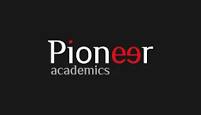(October 27, 2025) — Pioneer Academics today released 9 Best Practices for Admissions in the Era of AI, a new white paper that examines how generative artificial intelligence is reshaping college admissions and offers a practical roadmap for institutions to ensure fairness, transparency, and authentic student evaluation.
“At Pioneer, we see firsthand how AI is changing the admissions landscape,” said Matthew Jaskol, Founder of Pioneer Academics. “AI raises real concerns about authorship and fairness, but it can also level a playing field that has never been fully equitable. Our goal is to help schools and universities uphold integrity while embracing innovation.”
Drawing from Pioneer’s review of thousands of applications each year and case studies from leading universities, the paper highlights key shifts in admissions policy and assessment. It urges institutions to:
- Define clear AI-use rules distinguishing brainstorming from prohibited drafting.
- Move beyond detection tools by using a multi-lens review for consistency and fairness.
- Rebalance essays with proctored writing, structured short answers, or anchored samples.
- Adopt real-time and project-based assessments to capture authentic student thinking.
- Center equity by allowing AI as an advising, not authoring, tool for under-resourced applicants.
The paper also reviews global trends in AI literacy and education policy, arguing that admissions must evolve alongside classroom innovation to accurately reflect student potential in an AI-enabled world.
Pioneer’s recommendations offer a framework for K–12 leaders, counselors, and higher-education admissions officers to modernize evaluation systems responsibly. For university decision makers, please visit: https://pioneeracademics.com/news/9-best-practices-for-admissions-in-the-era-of-ai/
For students, Independent Education Consultants, and Guidance Counselors please visit: https://pioneeracademics.com/news/ai-era-application-process-tips/
About Pioneer Academics
Founded in 2012, Pioneer Academics® is the world’s only fully accredited online research program for high school students. It connects them with university professors for rigorous, one-on-one mentorship, leading to original undergraduate-level research and up to four transferable college credits through Oberlin College. Its sister program, the Global Problem-Solving Institute (GPSI), brings 10th graders worldwide together in a 12-week virtual innovation lab to address complex challenges using systems- and design-thinking. GPSI participants earn two credits from the University of North Carolina at Chapel Hill. Together, Pioneer and GPSI prepare motivated students to become global scholars and problem-solvers. For more information, please visit: www.pioneeracademics.com

